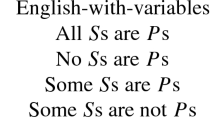Abstract
I argue that a recent philosophical interpretation by Jc Beall of the middle value of Weak Kleene (three-valued) logic (known also as Bochvar’s logic) as ‘being off-topic’ is untenable. My main claim is that “being off-topic” is a relation, not a property, and as such cannot serve as an interpretation of a truth-value.
Similar content being viewed by others
Notes
I use 0.5 as the third truth-value just because Beall does. It should not suggest that the truth-values are ordered in any way.
As the issue touches also on natural language (NL), I will use ‘sentence’ and ‘formula’ synonymously.
I confine the discussion here to propositional logics only.
I ignore here the more delicate issue of distinguishing truth-values from arbitrary algebraic values, since the issue of interpreting the truth-table is orthogonal to this distinction.
For the argument here, I can safely ignore relational assignments.
Standardly, this dependence is not transparent in propositional logics, usually seen as assigning arbitrary truth-values to atomic sentences, in all possible ways. In a setting in which atomic sentences are viewed as regimentation of sentences in a more expressive language, having a richer space of semantic properties, this dependence can be made more transparent.
I relate here to binary operations only just for convenience. The same holds for applying an nary operation for any n.
Actually, I believe that for logical object languages a theory of topics is better formulated in a first-order setting, offering more natural candidates for counting as topics than propositional languages do.
I do not commit myself here to a specific view of how many topics can a sentence have. I just assume that this number is at least one.
I very much share Beall’s rejection of Addition—Gentzen’s disjunction introduction—but for reasons differing from his altogether.
This can easily be extended to the case where a sentence has more than one topic.
The distinction is not always sharp. I simplify here and take it as such for explanatory purposes, as this is not the topic of the paper.
Again, there are exceptions. For example, \({\textsf {Mary\ is\ a\ sister\ and\ John\ is\ brother\ of\ Bill}}\). I again simplify the linguistic issues for explanatory reasons.
References
Angell, R. B. (1962). A propositional logic with subjunctive conditionals. Journal of Symbolic Logic, 27, 327–343.
Baaz, M., Fermüler, C. G., & Zach, R. (1993). Systematic construction of natural deduction systems for many-valued logics. In Proceedings of the 23rd international symposium on multiple valued logics, Sacramento, CA, May 1993 (pp. 208–213). IEEE Press, Los Alamitos
Beall, J. (2016). A new interpretation of weak Kleene logic. Australasian Journal of Logic, 13, 136–142.
Belnap, N. D. (1976). How a computer should think. In G. Ryle (Ed.), Contemporary aspects of philosophy (pp. 30–56). Stocksfield: Oriel Press.
Belnap, N. D. (1977). A useful four-valued logic. In J. Michael Dunn & G. Epstein (Eds.), Modern uses of multiple-valued logic (pp. 8–37). Dordrecht: Reidl.
Bochvar, D. A., & Bergmann, M. (1981). On a three-valued logical calculus and its application to the analysis of the paradoxes of the classical extended functional calculus. History and Philosophy of Logic, 2(1–2), 87–112. (Originally published in 1938. The 1981 publication is an English translation by Bergmann).
Demolombe, R., & Jones, A. J. I. (1995). Reasoning about topics: Towards a formal theory. In Proceedings of the fall symposium on Formalizing Context, MIT. AAAI Press
Demolombe, R., & Jones, A. J. I. (1999). On sentences of the kind sentence p is about topic t. In H. J. Olbach & U. Reyle (Eds.), Logic, language and reasoning Trends in logic series: Essays in honour of Dov Gabbay, Studia Logica Library (Vol. 5, pp. 125–144). Dordrecht: Springer.
Dunn, J. M. (1976). Intuitive semantics for first-degree entailments and coupled trees. Philosophical Studies, 29, 149–168.
Francez, N. (2018). Diversification of object-languages for propositional logics. Journal of Logic, Language and Information, 27(3), 193–203. https://doi.org/10.1007/s10849-018-9266-6.
Francez, N., & Kaminski, M. (2017). On poly-logistic natural-deduction. Journal of Applied Logic. Presented at ISRALOG17, Haifa, October (submitted)
Kleene, S. C. (1952). Introduction to metamathematics. Amsterdam: North-Holland.
Parry, W. T. (1933). Ein axiomensystem für eine neue art von implikation (analytische implikation). Ergebnisse eines mathematischen Kolloquiums, 4, 5–6.
Sagi, G. (2017). Contextualism, relativism and the liar. Erkentnis, 82(4), 913–928. https://doi.org/10.1007/s10670-016-9850-6.
Author information
Authors and Affiliations
Corresponding author
Appendix
Appendix
Below are the truth-tables of \(WK_{3}\).

Rights and permissions
About this article
Cite this article
Francez, N. On Beall’s New Interpretation of \(WK_{3}\). J of Log Lang and Inf 28, 1–7 (2019). https://doi.org/10.1007/s10849-018-9274-6
Published:
Issue Date:
DOI: https://doi.org/10.1007/s10849-018-9274-6



